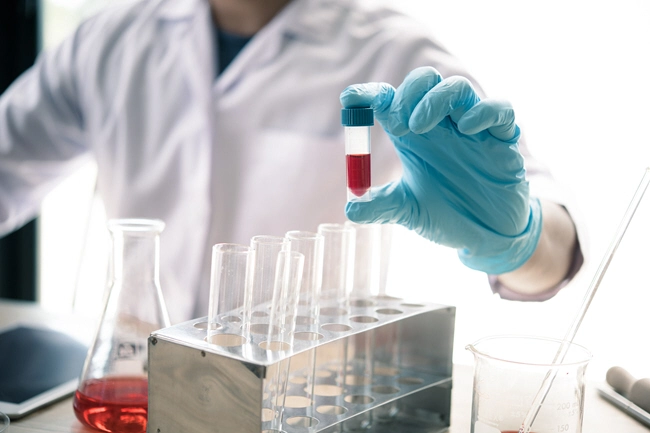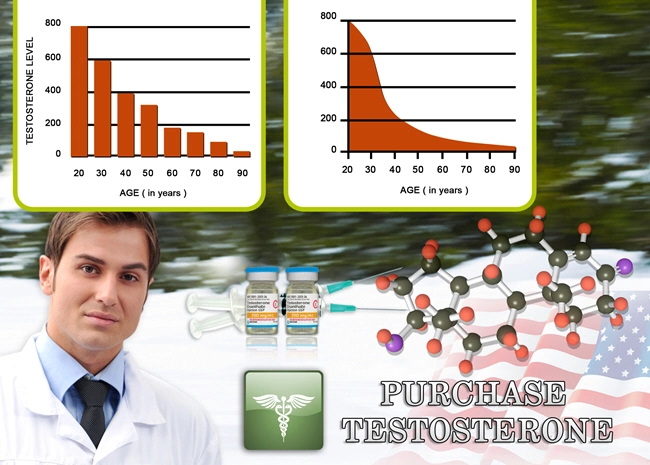
Introduction to Testosterone Propionate
Testosterone Propionate is a short-acting ester of testosterone, commonly used in hormone replacement therapy (HRT) for American males experiencing hypogonadism. This condition is characterized by the body's inability to produce sufficient testosterone, leading to various symptoms such as decreased libido, fatigue, and muscle loss. Understanding the role and administration of Testosterone Propionate can significantly enhance the quality of life for those affected.
The Mechanism of Action
Testosterone Propionate works by supplementing the body's natural testosterone levels. Once injected, it is rapidly absorbed into the bloodstream, where it exerts its effects by binding to androgen receptors in various tissues. This binding action promotes protein synthesis, increases nitrogen retention in muscles, and enhances red blood cell production, all of which contribute to improved physical performance and overall well-being.
Benefits for American Males
For American males, the use of Testosterone Propionate can be particularly beneficial. It helps restore normal testosterone levels, thereby alleviating symptoms of hypogonadism. Improved muscle mass and strength, increased energy levels, and enhanced sexual function are among the most notable benefits. Additionally, it can improve mood and cognitive function, which are often compromised in individuals with low testosterone levels.
Administration and Dosage
Testosterone Propionate is typically administered via intramuscular injection. Due to its short half-life, injections are usually required every two to three days to maintain stable testosterone levels. The dosage varies based on individual needs and is determined by a healthcare provider. It is crucial for patients to adhere to the prescribed regimen to achieve optimal results and minimize potential side effects.
Potential Side Effects
While Testosterone Propionate can offer significant benefits, it is not without potential side effects. Common issues include injection site pain, acne, and changes in mood. More serious side effects can include liver toxicity and cardiovascular risks, particularly if the hormone is used inappropriately or in excessive doses. Regular monitoring by a healthcare professional is essential to manage these risks effectively.
Monitoring and Safety
To ensure the safe use of Testosterone Propionate, regular blood tests are necessary to monitor testosterone levels and other relevant health markers. These tests help healthcare providers adjust dosages and manage any adverse effects promptly. It is also important for patients to report any unusual symptoms to their healthcare provider immediately.
Legal and Ethical Considerations
In the United States, Testosterone Propionate is a controlled substance, and its use is regulated. It is only legally available with a prescription and should be used under the supervision of a qualified healthcare provider. Misuse of this hormone for non-medical purposes, such as performance enhancement, is illegal and can lead to serious health and legal consequences.
Conclusion
Testosterone Propionate plays a vital role in hormone replacement therapy for American males suffering from hypogonadism. By understanding its mechanism, benefits, and potential risks, patients can make informed decisions about their treatment. With proper administration and monitoring, Testosterone Propionate can significantly improve the quality of life for those affected by low testosterone levels. It is essential for individuals to work closely with their healthcare providers to ensure safe and effective use of this therapy.
Contact Us Today For A Free Consultation
Dear Patient,
Once you have completing the above contact form, for security purposes and confirmation, please confirm your information by calling us.
Please call now: 1-800-380-5339.
Welcoming You To Our Clinic, Professor Tom Henderson.

- Testosterone Propionate: Benefits, Risks, and Hormonal Balance for American Males [Last Updated On: March 17th, 2025] [Originally Added On: March 17th, 2025]
- Testosterone Propionate's Impact on Cognitive Function in American Males: Benefits and Risks [Last Updated On: March 17th, 2025] [Originally Added On: March 17th, 2025]
- Testosterone Propionate: Enhancing Male Fertility in American Men - Benefits and Risks [Last Updated On: March 18th, 2025] [Originally Added On: March 18th, 2025]
- Testosterone Propionate in American Sports: Ethical Issues and Health Risks for Male Athletes [Last Updated On: March 18th, 2025] [Originally Added On: March 18th, 2025]
- Testosterone Propionate's Role in Male Pattern Baldness Among American Men [Last Updated On: March 18th, 2025] [Originally Added On: March 18th, 2025]
- Testosterone Propionate: Enhancing Sleep Quality in American Men [Last Updated On: March 19th, 2025] [Originally Added On: March 19th, 2025]
- Testosterone Propionate's Role in Weight Management for Obese American Males [Last Updated On: March 20th, 2025] [Originally Added On: March 20th, 2025]
- Testosterone Propionate: Benefits, Risks, and Ethical Use in American Men [Last Updated On: March 20th, 2025] [Originally Added On: March 20th, 2025]
- Long-Term Health Risks of Testosterone Propionate Use in American Men [Last Updated On: March 21st, 2025] [Originally Added On: March 21st, 2025]
- Testosterone Propionate's Impact on Immune Function in American Males: A Comprehensive Review [Last Updated On: March 21st, 2025] [Originally Added On: March 21st, 2025]
- Testosterone Propionate: Boosting Energy Levels in American Men [Last Updated On: March 21st, 2025] [Originally Added On: March 21st, 2025]
- Testosterone Propionate: A Promising Therapy for Osteoporosis in American Men [Last Updated On: March 21st, 2025] [Originally Added On: March 21st, 2025]
- Testosterone Propionate: A Promising Treatment for Depression in American Males [Last Updated On: March 22nd, 2025] [Originally Added On: March 22nd, 2025]
- Testosterone Propionate: Benefits, Risks, and Use in American Male Bodybuilding [Last Updated On: March 22nd, 2025] [Originally Added On: March 22nd, 2025]
- Testosterone Propionate: A Promising Treatment for Chronic Pain in American Men [Last Updated On: March 22nd, 2025] [Originally Added On: March 22nd, 2025]
- Testosterone Propionate: Benefits, Risks, and Aesthetic Use in American Males [Last Updated On: March 22nd, 2025] [Originally Added On: March 22nd, 2025]
- Testosterone Propionate: A Promising Treatment for Obesity in American Males [Last Updated On: March 23rd, 2025] [Originally Added On: March 23rd, 2025]
- Testosterone Propionate Use and Diabetes Risk in American Males: A Comprehensive Analysis [Last Updated On: March 23rd, 2025] [Originally Added On: March 23rd, 2025]
- Testosterone Propionate: Psychological Effects and Risks for American Men [Last Updated On: March 23rd, 2025] [Originally Added On: March 23rd, 2025]
- Testosterone Propionate: A Promising Treatment for Chronic Fatigue in American Males [Last Updated On: March 23rd, 2025] [Originally Added On: March 23rd, 2025]
- Testosterone Propionate: Enhancing Muscle, Energy, and Psychological Health in American Men [Last Updated On: March 24th, 2025] [Originally Added On: March 24th, 2025]
- Testosterone Propionate's Cardiovascular Impact on American Men: Benefits, Risks, and Guidelines [Last Updated On: March 24th, 2025] [Originally Added On: March 24th, 2025]
- Testosterone Propionate: Enhancing Libido and Sexual Performance in American Men [Last Updated On: March 24th, 2025] [Originally Added On: March 24th, 2025]
- Testosterone Propionate: Enhancing Muscle Recovery in American Men - Benefits and Risks [Last Updated On: March 24th, 2025] [Originally Added On: March 24th, 2025]
- Testosterone Propionate: Enhancing Recovery and Performance in American Male Athletes [Last Updated On: March 24th, 2025] [Originally Added On: March 24th, 2025]
- Testosterone Propionate: A Promising Treatment for Anemia in American Men [Last Updated On: March 25th, 2025] [Originally Added On: March 25th, 2025]
- Testosterone Propionate: Benefits, Risks, and Legal Issues for American Men [Last Updated On: March 25th, 2025] [Originally Added On: March 25th, 2025]
- Testosterone Propionate Use and Liver Health Risks in American Males [Last Updated On: March 25th, 2025] [Originally Added On: March 25th, 2025]
- Testosterone Propionate's Impact on Bone Health in American Men: A Comprehensive Analysis [Last Updated On: March 25th, 2025] [Originally Added On: March 25th, 2025]
- Testosterone Propionate's Impact on Blood Pressure in American Men: A Comprehensive Analysis [Last Updated On: March 25th, 2025] [Originally Added On: March 25th, 2025]
- Testosterone Propionate: Enhancing Sexual Function in American Men [Last Updated On: March 26th, 2025] [Originally Added On: March 26th, 2025]
- Testosterone Propionate: Enhancing Joint Health in American Men [Last Updated On: March 26th, 2025] [Originally Added On: March 26th, 2025]
- Testosterone Propionate: Enhancing Sexual Health in American Men - Benefits and Risks [Last Updated On: March 26th, 2025] [Originally Added On: March 26th, 2025]
- Testosterone Propionate: Enhancing Endurance in American Men - Benefits and Risks [Last Updated On: March 26th, 2025] [Originally Added On: March 26th, 2025]
- Testosterone Propionate's Impact on Immune System in American Men: Risks and Benefits [Last Updated On: March 26th, 2025] [Originally Added On: March 26th, 2025]
- Testosterone Propionate: A Promising Treatment for Muscle Wasting in American Males [Last Updated On: March 26th, 2025] [Originally Added On: March 26th, 2025]
- Testosterone Propionate: Benefits, Risks, and Legalities for American Weightlifters [Last Updated On: March 26th, 2025] [Originally Added On: March 26th, 2025]
- Testosterone Propionate: A Promising Stress Management Solution for American Men [Last Updated On: March 26th, 2025] [Originally Added On: March 26th, 2025]
- Testosterone Propionate's Impact on Cholesterol Levels in American Men: Cardiovascular Risks [Last Updated On: March 26th, 2025] [Originally Added On: March 26th, 2025]
- Testosterone Propionate in Anti-Aging: Benefits, Risks, and Clinical Insights for American Men [Last Updated On: March 26th, 2025] [Originally Added On: March 26th, 2025]
- Testosterone Propionate: Boosting Energy in American Men with Low Testosterone [Last Updated On: March 27th, 2025] [Originally Added On: March 27th, 2025]
- Testosterone Propionate: Managing Hormonal Imbalances in American Men [Last Updated On: March 27th, 2025] [Originally Added On: March 27th, 2025]
- Testosterone Propionate's Impact on Mood Swings in American Men: Benefits and Risks [Last Updated On: March 27th, 2025] [Originally Added On: March 27th, 2025]
- Testosterone Propionate: A Promising Treatment for Low Sperm Count in American Males [Last Updated On: March 27th, 2025] [Originally Added On: March 27th, 2025]
- Testosterone Propionate: Enhancing Strength and Performance in American Men [Last Updated On: March 28th, 2025] [Originally Added On: March 28th, 2025]
- Testosterone Propionate: Uses, Benefits, and Risks in Male Hormone Therapy [Last Updated On: March 29th, 2025] [Originally Added On: March 29th, 2025]
- Testosterone Propionate: Uses, Benefits, and Risks for American Men's Health and Fitness [Last Updated On: March 29th, 2025] [Originally Added On: March 29th, 2025]
- Testosterone Propionate: Cardiovascular Effects and Risks in American Men [Last Updated On: March 29th, 2025] [Originally Added On: March 29th, 2025]
- Testosterone Propionate: Benefits, Dosage, and Risks for American Men's Muscle Building [Last Updated On: March 30th, 2025] [Originally Added On: March 30th, 2025]
- Testosterone Propionate: Enhancing Mental Health in American Men - Benefits and Risks [Last Updated On: March 30th, 2025] [Originally Added On: March 30th, 2025]
- Testosterone Propionate: Enhancing Sexual Health and Performance in American Men [Last Updated On: March 30th, 2025] [Originally Added On: March 30th, 2025]
- Testosterone Propionate: Enhancing Hormonal Health in American Men [Last Updated On: March 31st, 2025] [Originally Added On: March 31st, 2025]
- Testosterone Propionate: Enhancing Bone Density in American Men [Last Updated On: April 2nd, 2025] [Originally Added On: April 2nd, 2025]
- Testosterone Propionate's Impact on Emotional Health in American Men [Last Updated On: April 2nd, 2025] [Originally Added On: April 2nd, 2025]
- Testosterone Propionate in Sports: Benefits, Risks, and Ethical Dilemmas for American Athletes [Last Updated On: April 4th, 2025] [Originally Added On: April 4th, 2025]
- Testosterone Propionate: Enhancing Strength and Risks for American Men [Last Updated On: April 5th, 2025] [Originally Added On: April 5th, 2025]
- Testosterone Propionate: A Potential Treatment for Fatigue in American Males [Last Updated On: April 5th, 2025] [Originally Added On: April 5th, 2025]
- Testosterone Propionate: Benefits, Risks, and Uses in American Men's Health and Fitness [Last Updated On: April 6th, 2025] [Originally Added On: April 6th, 2025]
- Testosterone Propionate: A Fast-Acting Solution for Muscle Loss in American Males [Last Updated On: April 7th, 2025] [Originally Added On: April 7th, 2025]
- Testosterone Propionate: Enhancing Sexual Desire and Function in American Men [Last Updated On: April 8th, 2025] [Originally Added On: April 8th, 2025]
- Testosterone Propionate: Enhancing Strength Training in American Men - Benefits and Risks [Last Updated On: April 8th, 2025] [Originally Added On: April 8th, 2025]
- Testosterone Propionate's Impact on Cardiovascular Health in American Men: Risks and Mitigation [Last Updated On: April 10th, 2025] [Originally Added On: April 10th, 2025]
- Testosterone Propionate: Psychological Impacts and Benefits for American Men [Last Updated On: April 10th, 2025] [Originally Added On: April 10th, 2025]
- Testosterone Propionate: Enhancing American Men's Health Through Hormone Replacement Therapy [Last Updated On: April 11th, 2025] [Originally Added On: April 11th, 2025]
- Testosterone Propionate: Benefits, Administration, and Considerations for American Men's HRT [Last Updated On: April 12th, 2025] [Originally Added On: April 12th, 2025]
- Testosterone Propionate: Effects, Risks, and Reproductive Health Impact in American Men [Last Updated On: April 13th, 2025] [Originally Added On: April 13th, 2025]
- Testosterone Propionate: Enhancing Sports Performance and Associated Risks for American Athletes [Last Updated On: April 14th, 2025] [Originally Added On: April 14th, 2025]
- Testosterone Propionate: Enhancing Mood and Cognition in American Men [Last Updated On: April 15th, 2025] [Originally Added On: April 15th, 2025]
- Testosterone Propionate: A Promising Therapy for Sarcopenia in Aging American Males [Last Updated On: April 15th, 2025] [Originally Added On: April 15th, 2025]
- Testosterone Propionate: Benefits, Risks, and Ethical Use in Men's Health [Last Updated On: April 16th, 2025] [Originally Added On: April 16th, 2025]
- Testosterone Propionate: Enhancing Bone and Joint Health in Aging American Men [Last Updated On: April 16th, 2025] [Originally Added On: April 16th, 2025]
- Testosterone Propionate: Cardiovascular Benefits and Risks in American Men [Last Updated On: April 18th, 2025] [Originally Added On: April 18th, 2025]
- Testosterone Propionate: Enhancing Performance and Risks for American Men [Last Updated On: April 18th, 2025] [Originally Added On: April 18th, 2025]
- Testosterone Propionate: A Promising Treatment for Lethargy in American Males [Last Updated On: April 18th, 2025] [Originally Added On: April 18th, 2025]
- Testosterone Propionate in Men's Health: Benefits, Risks, and Administration in the US [Last Updated On: April 19th, 2025] [Originally Added On: April 19th, 2025]
- Testosterone Propionate: Enhancing Sexual Vitality and Risks in American Men [Last Updated On: April 19th, 2025] [Originally Added On: April 19th, 2025]
- Testosterone Propionate: Enhancing Emotional Well-being in American Men [Last Updated On: April 20th, 2025] [Originally Added On: April 20th, 2025]









